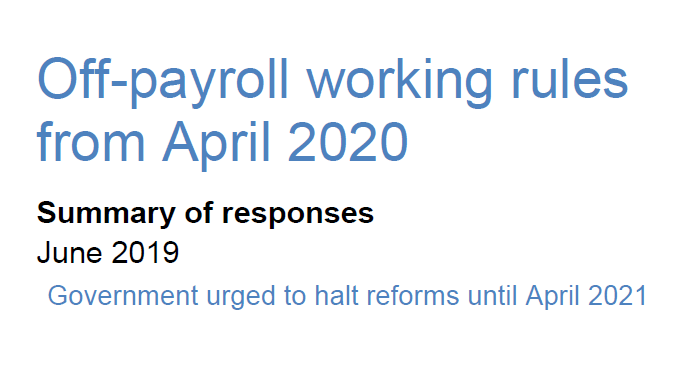A summary of responses to HMRC’s ‘Off-Payroll working rules from April 2020’ consultation by ContractorCalculator has revealed serious concerns about the new proposals to address failings with the current legislation.
The summary identifies several fundamental flaws with HMRC’s proposals, with experts from the tax, contracting, recruitment and legal sectors warning of the damage that legislating these changes for April 2020 would cause the flexible workforce and UK plc.
Among the recurring issues and recommendations made were:
- Halt reforms until April 2021
- Strong opposition to client-led disagreement process
- Liability model grossly unfair on compliant parties
- Calls for deemed employees to receive employment rights
- Small company exemption deemed unsuitable
- HMRC’s Check Employment Status for Tax (CEST) tool is still not fit-for-purpose
- Widespread non-compliance with the Off-Payroll rules in the public sector
- Concerns over the timing of the proposals in relation to Brexit.
The feedback analysed consists of 29 consultation responses from the likes of the Institute of Chartered Accountants in England and Wales (ICAEW), the Confederation of British Industry (CBI), the Recruitment and Employment Confederation (REC) and the Association of Independent Professionals and the Self Employed (IPSE).
DOWNLOAD: Off-Payroll - Summary of Responses
“Our analysis has uncovered a host of practical and ethical issues with HMRC’s proposals for the private sector, and presents the most prominent feedback in a balanced manner,” highlights ContractorCalculator CEO Dave Chaplin.
“Following HMRC’s previous Off-Payroll summary of responses, we simply don’t trust the taxman to deliver an accurate representation of the feedback provided. Too often we have seen HMRC gloss over and blatantly ignore the concerns shared by respondents.”
New Off-Payroll consultation brings old issues to the fore
Notable amongst the large majority of consultation responses was the re-emergence of many issues raised in response to the previous consultation in September. According to Chaplin, this shows that HMRC is not doing enough to address the very serious concerns that the Off-Payroll rules have brought to the fore:
“In our September 2018 summary of responses, we identified the 10 most prominent issues raised by industry experts and insiders. HMRC attempted to address just two of these. Unfortunately, both of the taxman’s proposed solutions have been shot down with considerable arguments.”
Once again, stakeholders urged HMRC to consider IR35 holistically by granting employment rights to ‘deemed employees’. Many warned that a failure to address the current imbalance would damage workforce flexibility by deterring would-be contractors, with a submission from a selection of pharmaceutical and locum bodies warning: “If this flexibility is disrupted significantly, it could impede the necessary supply of medicines and services to patients.”
Also prominent were calls for a full review into the impact of the public sector changes, with IR35 advisors Bauer & Cottrell commenting: “We still have a situation where no proper analysis has been undertaken of how the public sector rules have worked and the true impact, as demonstrated by numerous bodies, has simply been ignored.”
Chaplin adds: “It is not good enough for HMRC to ignore the bulk of these very legitimate concerns, many of which have been raised by organisations with a unique insight into the effects of the Off-Payroll rules in the public sector.”
DOWNLOAD: Off-Payroll - Summary of Responses
Stakeholders expose fundamental flaws in HMRC new proposals
HMRC has attempted to address concerns over the unfair burden that compliance requirements would place on small businesses. However, the taxman’s proposed small company exemption was considered by the majority of respondents to be too complicated to apply accurately in practice, as well as prone to exploitation from larger firms seeking to circumvent their responsibilities.
Meanwhile, HMRC’s proposed client-led status disagreement process came under heavy criticism. Stakeholders were unanimous that any process needs to be led by an impartial, independent party, with many highlighting that HMRC’s proposal restricts access to tribunals and would likely incite risk-averse blanket assessments.
“This is our biggest concern with the proposals”, commented the Freelancer & Contractor Services Association, with IPSE adding: “It is against natural justice that the dominant party in the process should be empowered to lead the disagreement process.”
HMRC’s plans to impose tax liability risk on compliant organisations where it is unable to recoup sums from other non-compliant parties in a supply chain also faced strong opposition. “The approach achieves nothing other than HMRC’s satisfaction that it would have multiple targets for tax collection,” stated the Association of Recruitment Consultancies (ARC).
Almost all respondents called for a further delay to any legislation until 2021, stressing that HMRC has not given businesses adequate time to prepare for an April 2020 rollout, whilst urging the taxman to use any extra time granted to reconsider the currently unworkable proposals.
“This summary makes it clear that HMRC has a lot of work to do before it can seriously consider extending the Off-Payroll rules to the private sector,” comments Chaplin. “Many have urged HMRC to take stock, instead of ploughing ahead with its ill-conceived plans. At the very least, a further postponement until April 2021 is needed to enable HMRC to attempt to fix the many flaws in its plans.”

